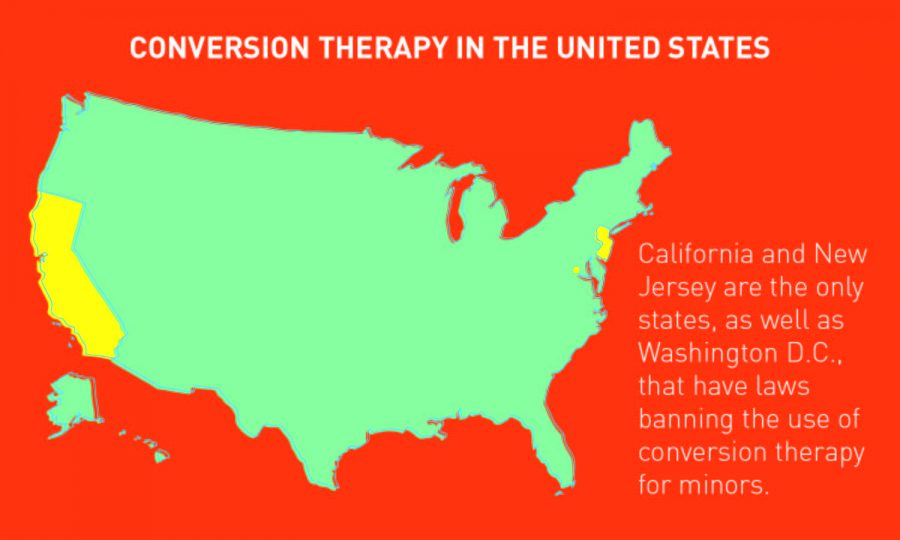Obama says no to conversion therapy
Conversion therapy in the United States
April 17, 2015
President Barack Obama and his administration spoke out against LGBTQ conversion therapy on April 8 in response to a petition posted to the White House website calling for a federal end to the controversial practice. The petition was created in honor of Leelah Alcorn, a 17-year-old transgender girl who died by suicide in December 2014. In the suicide note she posted on her Tumblr blog, Alcorn cited the trauma of being forced by her parents to undergo conversion therapy as a minor.
The statement, issued by senior presidential adviser Valerie Jarrett, said, “As part of our dedication to protecting America’s youth, this Administration supports efforts to ban the use of conversion therapy for minors.”
Advocates for a legislative ban on conversion therapy applauded the White House for taking a stance on the issue.
“I am glad to see some visibility that calls these treatments out for what they really are, and I am especially pleased that the president took the step of coming out against conversion therapies, which is pretty extraordinary,” said Douglas Haldeman, chair of the clinical psychology doctoral program at John F. Kennedy University in Pleasant Hill, California. “We’re finding now the culture is starting to acknowledge what we have known in mainstream mental health all along—that these things don’t work and they’re potentially dangerous.”
Haldeman, an advocate for the banning of conversion therapies, has witnessed the effects conversion therapy can have through his work as a psychologist over the last four decades. Those exposed to the therapy in their youth suffer severe trauma, Haldeman said.
“Back in the days when I first started working with survivors of conversion therapy, I saw a lot of people who had been electroshocked, given nausea-inducing drugs while they were viewing homoerotic material,” Haldeman said. “These kinds of interventions very often had a profound effect on the person’s entire system so they would become depressed, their guilt about being homosexual would be exacerbated by their inability to change through conversion therapy, [and they would] develop chronic inability to connect with people in intimate relationships. [Victims are] very often suicidal, and in some cases that have been in the national news lately, commit suicide.”
Talk therapy and religious therapies are the most common conversion therapies used today, according to Haldeman.
“There is a wide range of possible negative outcomes for people who go through conversion therapy, which is not counterbalanced by any scientific evidence to suggest that it works,” Haldeman said. “This topic has been studied for many, many years. In mainstream mental health, we believe that the problem is not with the individual. Homosexuality is not something to be fixed. Homophobia and sexual prejudice in culture, in family, in religion—those are the things that need to be changed.”
Many LGBTQ rights organizations, such as Equality Illinois and Center on Halsted in Chicago’s Boystown community, advocate for an end to conversion therapy. The National Center for Lesbian Rights launched the #BornPerfect campaign in June 2014 and works to raise awareness of the dangers of conversion therapy and to see legislation pass to combat it, according to the NCLR’s website. Center on Halsted has recently worked with the campaign in an effort to prompt such legislation in Illinois, according to Jane Merrill, Center on Halsted’s advocacy and community engagement manager.
“For us, the Born Perfect hashtag was a different way to frame [the movement],” Merrill said. “It can be really hard to connect with ‘You should ban conversion therapy.’ But it’s pretty universal when someone says, ‘What does it mean to be born perfect?’ That’s something that’s more universally understood.”
Center on Halsted advocates for an end to conversion therapy because the therapeutic process is a legally sanctioned form of homophobia, Merrill said.
“All evidence shows that it’s a really harmful practice,” Merrill said. “The idea behind it is that being LGBTQ is a disorder, which we know is not true. It allows that thought and homophobia to be continued, which is something that the center stands against in every form. We believe our community will be safer physically, mentally [and] emotionally if conversion therapy is banned.”
Clinton Anderson, director of the LGBT Concerns Office at the American Psychological Association, said the APA does not support conversion therapies. Anderson said the APA promotes other forms of therapy that do not aim to change people’s sexual orientation.
“We believe therapies that don’t aim to change people’s sexual orientation can help people achieve social support,” Anderson said. “[We support] therapies that don’t have a pre-ordained goal that someone should change, but rather helps people explore their identities fully, particularly if they are distressed by their religious beliefs and their sexuality. [Talk therapy] allows them to figure out the appropriate balance for them between those two parts of themselves .”








